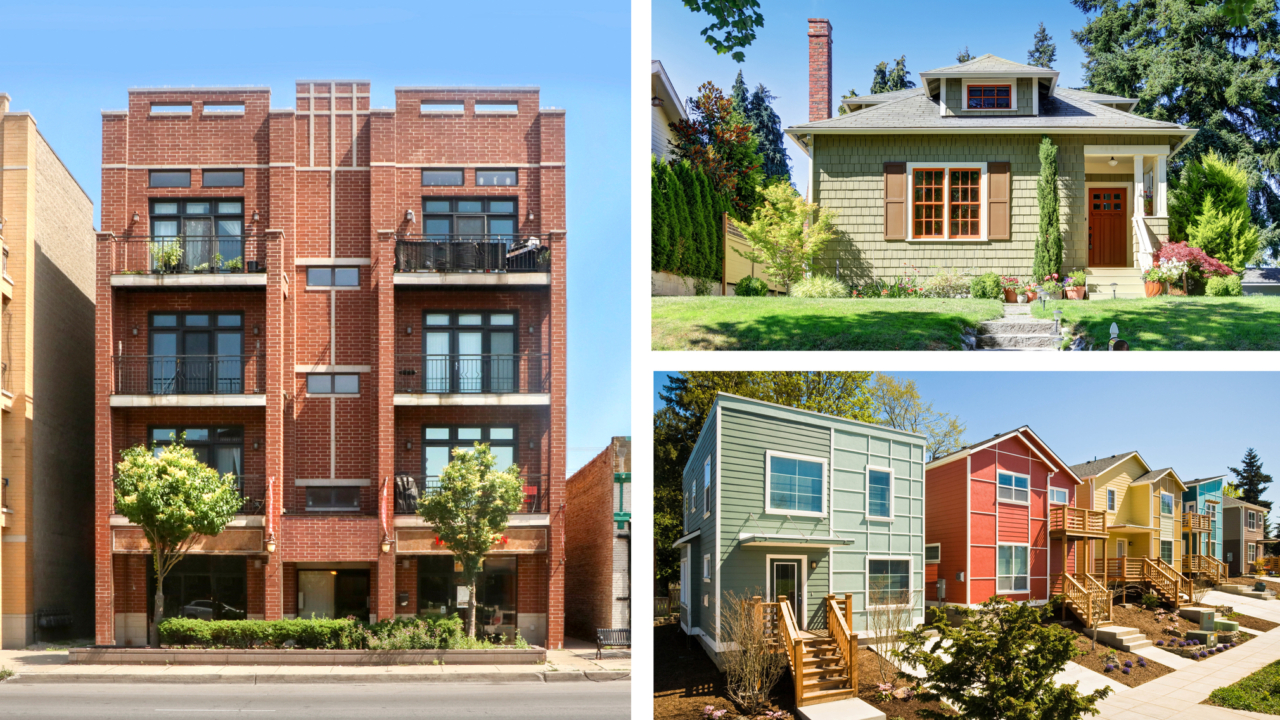Can You Really Buy a House with Bitcoin?
Cryptocurrency and NFT transactions are making real estate headlines. But what do real-life home purchases made with virtual money actually entail?

Written by Leanne Potts on June 9, 2022
Cryptocurrency has come a long way from its early days as a niche form of payment confined to internet forums. You can now use virtual money in a wide range of real-world transactions, from buying a car to donating to a charity. This wider acceptance of crypto has a lot of people wondering: Can you buy a house with bitcoin, a type of cryptocurrency?
The short answer is yes, you can buy a house with bitcoins, or other types of cryptocurrency. Many global real estate companies offer their listings in cryptocurrency (as of writing, there were approximately 100 Zillow listings that mention bitcoin, like this one in San Juan, Puerto Rico), and there are real estate platforms that specialize in facilitating crypto real estate purchases. But even though you can buy a house with crypto, the overall percentage of homes purchased with crypto is small, says Jerry Eitel, Chief Metaverse Officer and crypto expert at Prager Metis International Group. That's because crypto is still unknown territory for most real estate agents, buyers and sellers.
Note: This article is for informational purposes and is not intended to be legal or financial advice. If you have any questions, contact a local attorney, financial advisor, or tax advisor.
A lot of people are leery of handling the biggest financial investment of their lives — their home — with a payment method as volatile, unregulated and new as crypto, Eitel says. “Homeownership is a bastion where people want security. It's the one thing that people want to be real and regulated, with as few risks as possible,' he says. “They're wary of tying that to an algorithm.'
Buying a home with cryptocurrency isn't common or simple, but it can be done. Here are four ways it’s possible:
1. Cash out your cryptocurrency into dollars
The most low-tech way to buy a home with cryptocurrency is to convert just enough to dollars to pay for the house. However, you’ll want to take tax implications into consideration. Depending on how long you owned the crypto, you may pay capital gains taxes, just as you would if you sold stock. If you cash out and make a profit on your crypto, you'll owe taxes on the profit that are calculated based on your income bracket. This IRS FAQ addresses virtual currency tax rules in more detail.
“Homeownership is a bastion where people want security. It’s the one thing that people want to be real and regulated, with as few risks as possible. They’re wary of tying that to an algorithm.”
2. Transfer crypto from buyer to seller directly
This is a crypto transaction at its purest. The buyer of the house transfers cryptocurrency directly from their digital wallet to the seller's digital wallet. But it might not be as easy as it sounds, because most traditional real estate agents aren't set up to get their commission in crypto. To go this route, you'll need to find a lawyer and a real estate agent who are familiar with crypto and can help you work out the escrow. Then the escrow will need to go through an accredited bank and a title company. You'll also need to find a home seller who's willing to accept crypto as currency.
3. Get a mortgage with crypto as collateral
Startup crypto-backed lenders allow you to leverage your bitcoin or other cryptocurrency without selling it and facing a capital gains tax by letting you use it as collateral. These loans can be risky. If the value of crypto falls, the borrower may have to put up more crypto or other collateral. This is an expensive situation known as a margin call.
Crypto-collateral loans aren't simple because they are not available in all states, and crypto's volatility can make it hard to determine the loan-to-value (LTV) ratio. Some lenders allow borrowers to take out loans of up to 100% of a home's purchase price, while others have crypto down payment requirements.
4. Buy a house with an NFT
You're thinking, wait, aren't NFTs (non-fungible tokens) a way to own digital art? Yes. But these digital assets are also used as 'smart contracts' for home deals. These digitally coded records can act as both real estate deeds and payments. Taylor Parrino, a crypto-certified Miami real estate agent, told Zillow she recently sold a home in Tampa as an NFT-backed transaction. The buyer purchased a single-family home for $210 Ethereum ($615,000 USD). In return, they got an NFT that was a digital image of the house as proof of ownership.
Here's how this cutting-edge deal worked: the NFT was linked to a limited liability company (LLC) that owned the physical property. Parrino then auctioned off the NFT, giving the winner the rights to the LLC that owned the house. The NFT was transferred directly to the buyer's digital wallet. Ownership of the home was transferred along with the NFT. “Using an NFT speeds up the process and makes it an instant purchase,' Parrino says. “I did the closing in 24 hours.'
“Using an NFT speeds up the process and makes it an instant purchase. I did the closing in 24 hours.”
During the two-week auction for the NFT, bidders were able to go to an open house and get an inspection report. “It's very transparent,' Parrino says. “There's a QR code on the deed on the website, so the bidder can scan the code and get all the documents related to the house online.'

Pros of buying a house with crypto
Here are two upsides to buying a home with bitcoin or other cryptocurrencies.
The purchase is speedy. Buying a home with crypto can be like buying with cash. You get around all the hurdles that come with a mortgage (assuming you’re not getting a crypto-backed loan).
You can diversify your investments. Crypto is the epitome of a volatile asset. Its value changes swiftly, while home values tend to stay more stable.
Cons of buying a house with crypto
The home-buying process is built around an established system of banks and other institutions. These don't play well with a decentralized currency like crypto. Currently, there are more cons than pros to using crypto to buy a home.
It might be hard to find companies that take crypto as payment. Sellers, real estate agents, banks and title companies may prefer good, old-fashioned currency like the dollar to decentralized crypto.
Crypto is unregulated. You typically won't get legal protections in a crypto home purchase like a traditional home purchase. Crypto transactions are irreversible, so there are no backsies if the seller reneges on some part of the home deal. And crypto's much-touted ability to keep transactions anonymous could lead to legal problems in a home purchase. Try clearing a title when you don't know who the owner of a house really is.
Taxes can be a bear. As we said earlier, if you sell your crypto to buy a house, you may face a hefty capital gains tax.
Crypto-collateral mortgages are volatile. “They can act like an adjustable-rate mortgage (ARM) on steroids,' Eitel says. A drop in crypto prices can change your LTV ratio. And this could require you to pony up more crypto to bring that ratio back to the original level.
It's hard to set a home-shopping budget. Crypto is so volatile that the amount you have to spend on a home when you begin your search may be very different when you're ready to buy.
The bottom line: Crypto's clumsy.
A crypto real estate deal can be complex, Eitel says. “There are a lot of fees and costs that come with a home purchase that can't be paid in crypto, so it's clumsy as hell.' He says the process may get simpler as the technology scales up. “Maybe at some point, everybody from the title office to county records will get on the blockchain and make crypto home purchases easier. But we're not there yet.'
A local agent can help you stay competitive on a budget.
They’ll help you get an edge without stretching your finances.
Talk with a local agent


